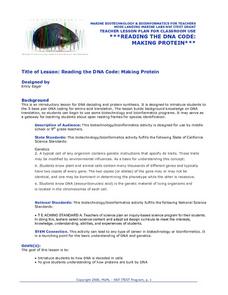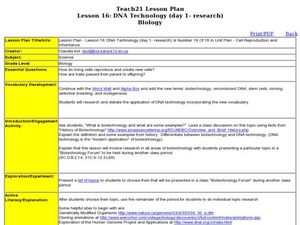Intel
Cell-to-Cell
The third in a series of 10 STEM project-based lessons focuses on cells types, functions, and physiology. Through research, discussions, writings, and presentations, groups learn about the difference between plant and animal cells, the...
Give and Let Live
Blood and Transplant: Bone Marrow
What causes someone to need a bone marrow transplant? Fascinate your class with a instructional activity on the intricate task of procuring bone marrow for patients suffering from illnesses like leukemia. The fourth and final installment...
Curated OER
Bioethics of Stem Cells
Young scholars complete a variety of activities as they examine the ethics behind stem cell research and use.
Curated OER
Cord Blood Banking and Transplantation
Students explore stem cells. In this stem cell lesson, students research print and Internet sources regarding types of stem cells and their attributes. Students discuss their research findings participate in a debate about cord blood...
Teach Engineering
Cell Membrane Structure and Function
Teach your class how to get out of a cell — or break in. The third installment in a seven-part series introduces the class to cell membranes and their functions. The lesson plan includes information to present to the class,...
Teach Engineering
Copycat Engineers
It's often said that imitation is the sincerest form of flattery. Young engineers learn about biomimicry, which uses nature to generate engineering ideas, in the fifth instructional activity of nine in a Life Science unit. Working in...
Curated OER
Getting Up the Nerve
Students examine the basics of the nervous system through an interactive program. They discover how the brain is linked to muscle movement. They can test cells through the interactive program to see how it reacts to different stimuli.
Curated OER
How to Make an Artificial Organ
Young scholars design bionic organs or limbs. In this medical technology lesson plan, students view a video about artificial organs and prosthetic limbs. They research the medical technology behind these advances and work to design a...
Towson University
Mystery Disease
How did scientists determine the cause of illness before technology? Science scholars play the role of medical researcher in an engaging guided inquiry activity. Using observations, technical reading, and Punnett squares, learners...
Teach Engineering
How Antibiotics Work
Take two pills and call me in the morning. The first lesson in a short unit of four introduces class members to delivery methods of medicines. The instruction introduces the question of which delivery method is best to get you feeling...
Curated OER
Elements of Biology: The Cell
Students study tissue engineering and its risks and benefits. In this biology instructional activity students take a stand on a side then research and support their position.
Curated OER
Two-Cell Battery
Students build their own two-cell battery and determine which electrolyte solution is best suited for making a battery. They discuss background information for their experiment, construct and test their battery, and using the chart on...
Teach Engineering
The Keepers of the Gate Challenge
Help your class make a connection between salt water and nanoscience. In the introductory lesson of a seven-part unit, the class explores why salt water helps a sore throat feel better. Pupils conduct preliminary research about the...
Baylor College
What Is a Neuron?
Your class won't get on your nerves while doing this modeling activity! After teaching the structure and function of a neuron using the included diagrams, give individuals some clay and chenille stems so that they can make their own...
Teach Engineering
The Temperature Effect
How temperature affects the efficiency of a solar panel is the focus of the third in a series of eight resources that presents how engineers are able to control the temperatures of photovoltaic panels. Class members find out how the...
Teach Engineering
Maximum Power Point
Investigate the maximum power output of a photovoltaic panel with a lesson that introduces the class to the maximum power point. Individuals learn how to determine the maximum power point of a solar panel by using Ohm's law and the power...
Curated OER
Cloning Around
Review concepts of cloning and genetic engineering and participate in a round-table discussion based on the ethics and potential of cloning with your class. Each learner then writes a formal essay on the topic, stemming from the debate.
Curated OER
Reading the Dna Code: Making Protein
Students study DNA decoding and protein synthesis. They use the amino acid table to translate DNA, break DNA strands into three nucleotide codes, and translate nucleotides into amino acid protein codes. They research the importance of...
Tech Museum of Innovation
Analogous Models
What goes into a museum display? A secondary-level STEM project prompts groups to design a museum display for the Tech Museum of Innovation. They create an analogous, interactive model illustrating a science concept to complete the...
Kenan Fellows
Unit 4: The Brain
Drugs interact with the brain to alter moods, emotions, and behaviors by changing the brain's chemistry, perceptions, and interactions. The final lesson in the Pharmacology unit shows scholars experiments, has them complete four labs,...
Agriculture in the Classroom
Understanding the Columbian Exchange Through Old World and New World Foods
If you're interested in teaching your class about the impact of the Columbian Exchange on contemporary society, this is worth a look. The plan begins with an introduction to the topic, which stems from a cell phone poll...
Curated OER
Lesson 16: DNA Technology
Students research different areas of biotechnology. In this biology instructional activity, students create a presentation about their research. They debate the topic presented and share their views on the subject.
Teach Engineering
Microfluidic Devices and Flow Rate
When you have to flow, you have to flow. The lesson introduces class members to microfluidic devices and their uses in medicine. They watch a short video on how the diameter affects the rate of flow. The worksheet has individuals...
Teach Engineering
Quantum Dots and the Harkess Method
The Fantastic Voyage is becoming close to reality. The class reads an article on the use of nanotechnology in the medical field and participate in a discussion about what they read. The discussion method helps class members become more...
Other popular searches
- Embryonic Stem Cell Research
- Stem Cell Research Ppt
- Stem Cell Research Pot
- Stem Cell Research Paper
- Stem Cell Research Debate
- Canadian Stem Cell Research

























